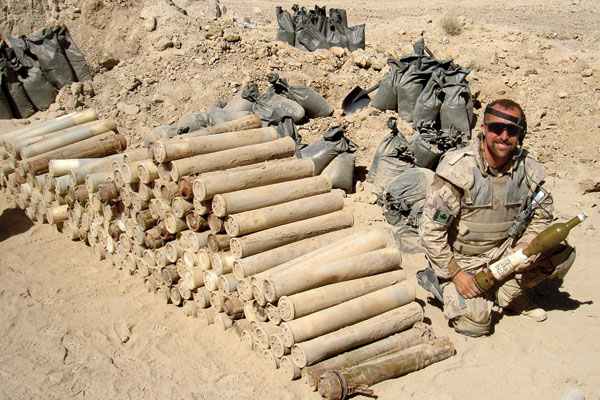The harrowing work of bomb disposal
By Lookout on May 05, 2014 with Comments 2

MS Keith Bruce sits next to a stack of ordnance recovered from an Improvised Explosive Device during Op Medusa.
It’s been seven years since the white Afghanistan dust coated his uniform, but MS Keith Bruce continues to remember his eight months service as an Explosive Ordnance Disposal (EOD) technician in the war torn country.
Many of those days were spent “outside the wire”, combing the landscape for booby traps, and when necessary, skilfully disarming bombs to put an end to their destructive role.
From August 2006 to February 2007 he called the Kandahar Air Field (KAF) home, and members of the 2 Combat Engineer Regiment his family.
While his regiment maintained a headquarters at KAF, he spent most of his time living in the surrounding territory.
“I’d be on base for a day or two and spend a few weeks in the field,” he says. “The barracks were nice, but for most of the deployment we were sleeping on or in our vehicles, or on a cot beside. It was a rough go, but we had a job to do.”
The job of EOD/IED technicians was a multi-faceted one. Besides the gruelling and dangerous work of disarming a bomb, they also conducted Post-Blast Forensics. This work had them investigating the scene of a detonation to try and glean as much intelligence about the device. This job took up much of MS Bruce’s time during Operation Medusa, the largest Canadian-led offensive in Afghanistan.
“If a vehicle was damaged or destroyed, or someone was killed in a blast, we would investigate the area afterwards to try and find information,” he says. “Anything that could be used at the HQ to identify the bomb maker, or figured out the materials used would be catalogued by us and sent back.”
Sometime MS Bruce and his team would have to remove casualties from vehicles to be transported back to base. At these moments he considered his own mortality.
“Before I left I thought about the possibility of me not coming back,” he says. “There was always the possibility that I’d have to kill, but I could also be killed. It’s just the way it was.”
Improvised Explosive Devices were a common tactic of the Taliban, and many Canadian and Allied military personnel succumbed to them. The sailor recalls one horrific day when his team was tasked to investigate a dump truck that had been stolen the day before only to turn up in the centre of a small village, south west of Kandahar.
Deploying with his EOD team, as well as two tanks for protection, they found the truck burnt out and sitting in the street.
“We could see heads popping in and out of windows, but the tanks must have changed some minds,” he recalls. “A team went out on foot to check the truck, and unfortunately they hit an IED buried near it. It took out four people including their medic, so we had to get a medevac. It was a hairy situation.”
During operations, if a Taliban bunker or similar structure was found, MS Bruce, the smallest and most experienced on the team, would enter to look for explosives.
“You don’t get used to that. Squeezing into those tiny spaces, not knowing what you’re going to find,” he says. “I thought about my family, and what we were doing there, and that’s all I could do.”
As the National Day of Honour nears, MS Bruce’s thoughts wander to Canada’s mission in Afghanistan.
“A lot of people gave up a lot of things over there, some of them their lives. We did it because we thought we could maybe change things, help people, give them a chance to live the way they wanted,” he says. “A lot of people take for granted the lives they get to live in Canada. People in other parts of the world live under a gun, never sure what’s going to happen. I hope we made a difference, even if just for a few people.”
Shawn O’Hara, Staff Writer
Filed Under: Top Stories
About the Author:






Shawn has moved to Vancouver, Patrick, but we will do our best to pass your message onto Keith.
Shawn, I have not talked to Keith in about thirty years but at this time I was thinking of him. If you have the ability to contact Keith and say hello from me and thank him for his service for over three decades to our great country that would be greatly appreciated.